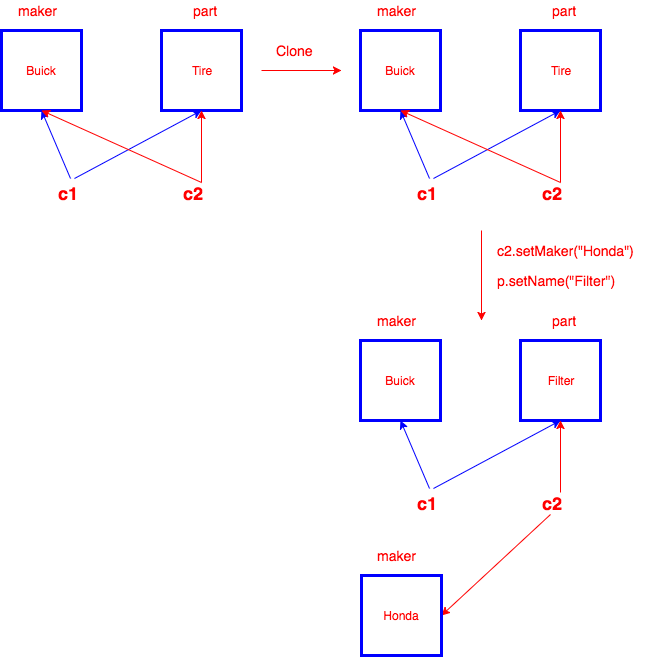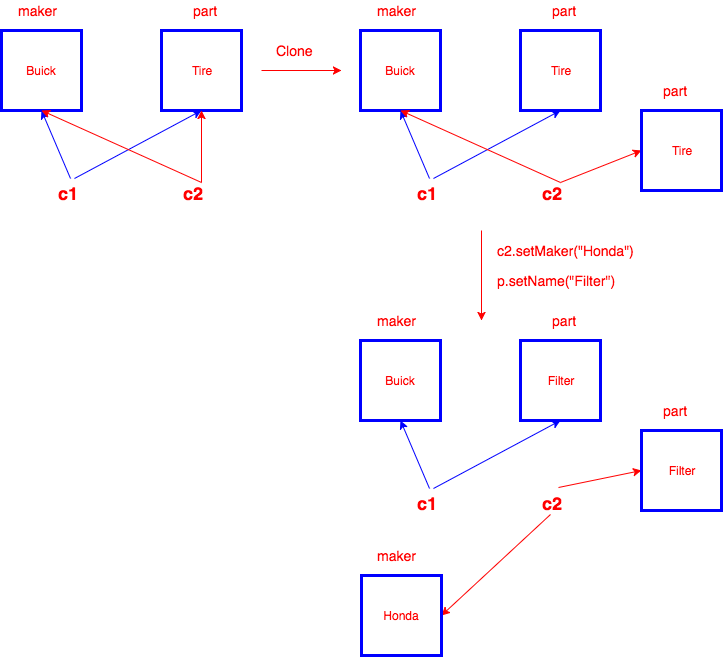Copy
Assignment
- Copy reference instead of making a real copy for both mutable objects and immutable objects
//immutable
public class Copy
{
public static void main(String args[])
{
//copy i to j
int i = 10;
int j;
j = i;
//i and j are pointing to the same address
System.out.println(System.identityHashCode(i));//2018699554
System.out.println(System.identityHashCode(j));//2018699554
//changing value causes that j points to a new address
j = 100;
System.out.println(System.identityHashCode(j));//1311053135
}
}
public class Car
{
private String maker;
public Car(String m)
{
maker = m;
}
public void setMaker(String m)
{
maker = m;
}
public String getMaker(String m)
{
return maker;
}
public String toString()
{
return "Car: "+maker;
}
}
public class Copy
{
public static void main(String args[])
{
Car c1 = new Car("Buick");
Car c2;
c2 = c1;
System.out.println(c1);//Buick
System.out.println(c2);//Buick
c2.setMaker("Honda");
System.out.println(c1);//Honda
System.out.println(c2);//Honda
}
}
Shallow Copy -- Clone
- Bitwise copy all attributes in an object
- The address of both mutable and immutable objects are copied to the new object
- Changing immutable attributes causes that a new immutable attributes are created, which means changing the immutable atttributes of the original object does not change the counterpart of the cloned object
- Changing mutable attributes does not create a new mutable attribute, which means changing the mutable atttributes of the original object change the counterpart of the cloned object

public class Part
{
private String name;
public Part(String n)
{
name = n;
}
public void setName(String n)
{
name = n;
}
public String getName()
{
return name;
}
public String toString()
{
return name;
}
}
public class Car implements Cloneable
{
private String maker;
private Part part;
public Car(String m, Part p)
{
maker = m;
part = p;
}
public void setMaker(String m)
{
maker = m;
}
public String getMaker(String m)
{
return maker;
}
public Part getPart()
{
return part;
}
public void displayID()
{
System.out.println(System.identityHashCode(maker));
System.out.println(System.identityHashCode(part));
}
@Override
protected Object clone() throws CloneNotSupportedException
{
return super.clone();
}
public String toString()
{
return "Car: "+maker+" "+part;
}
}
public class Copy
{
public static void main(String args[])
{
Part p = new Part("Tire");
Car c1 = new Car("Buick", p);
Car c2 = null;
try{
c2 = (Car) c1.clone();
}
catch (CloneNotSupportedException e)
{
e.printStackTrace();
}
System.out.println(c1);//Car: Buick Tire
System.out.println(c2);//Car: Buick Tire
c1.displayID();//2018699554 1211053135
c2.displayID();//2018699554 1211053135
c2.setMaker("Honda");
//p.setName("Filter");
c2.getPart().setName("Filter");
System.out.println(c1);//Buick Filter
System.out.println(c2);//Honda Filter
c1.displayID();//2018699554 1211053135
c2.displayID();//118352462 1311053135
}
}
Deep Copy -- Clone
- Immutable attributes, copy the address to the new object
- Mutable attributes, create a new copy to the new object
- Changing immutable attributes causes that a new immutable attributes are created, which means changing the immutable atttributes of the original object does not change the counterpart of the cloned object

public class Part implements Cloneable
{
private String name;
public Part(String n)
{
name = n;
}
public void setName(String n)
{
name = n;
}
public String getName()
{
return name;
}
@Override
protected Object clone() throws CloneNotSupportedException
{
return super.clone();
}
public String toString()
{
return name;
}
}
public class Car implements Cloneable
{
private String maker;
private Part part;
public Car(String m, Part p)
{
maker = m;
part = p;
}
public void setMaker(String m)
{
maker = m;
}
public String getMaker(String m)
{
return maker;
}
public Part getPart()
{
return part;
}
public void displayID()
{
System.out.println(System.identityHashCode(maker));
System.out.println(System.identityHashCode(part));
}
@Override
protected Object clone() throws CloneNotSupportedException
{
Car c = (Car) super.clone();
c.part = (Part) part.clone();
return c;
}
public String toString()
{
return "Car: "+maker+" "+part;
}
}
public class Copy
{
public static void main(String args[])
{
Part p = new Part("Tire");
Car c1 = new Car("Buick", p);
Car c2 = null;
try{
c2 = (Car) c1.clone();
}
catch (CloneNotSupportedException e)
{
e.printStackTrace();
}
System.out.println(c1);//Car: Buick Tire
System.out.println(c2);//Car: Buick Tire
c1.displayID();//2018699554 1311053135
c2.displayID();//2018699554 118352462
c2.setMaker("Honda");
//p.setName("Filter");
c2.getPart().setName("Filter");
System.out.println(c1);//Car: Buick Tire
System.out.println(c2);//Car: Honda Filter
c1.displayID();//2018699554 1311053135
c2.displayID();//1550089733 118352462
}
}
Deep Copy -- Copy Constructor
public class Part
{
private String name;
public Part(String n)
{
name = n;
}
public Part(Part p)
{
this(p.name);
}
public void setName(String n)
{
name = n;
}
public String getName()
{
return name;
}
public String toString()
{
return name;
}
}
public class Car
{
private String maker;
private Part part;
public Car(String m, Part p)
{
maker = m;
part = p;
}
public Car(Car c)
{
this(c.maker, new Part(c.part));
}
public void setMaker(String m)
{
maker = m;
}
public String getMaker(String m)
{
return maker;
}
public Part getPart()
{
return part;
}
public void displayID()
{
System.out.println(System.identityHashCode(maker));
System.out.println(System.identityHashCode(part));
}
public String toString()
{
return "Car: "+maker+" "+part;
}
}
public class Copy
{
public static void main(String args[])
{
Part p = new Part("Tire");
Car c1 = new Car("Buick", p);
Car c2 = new Car(c1);
System.out.println(c1);//Car: Buick Tire
System.out.println(c2);//Car: Buick Tire
c1.displayID();//2018699554 1311053135
c2.displayID();//2018699554 118352462
c2.setMaker("Honda");
//p.setName("Filter");
c2.getPart().setName("Filter");
System.out.println(c1);//Buick Tire
System.out.println(c2);//Honda Filter
c1.displayID();//2018699554 1311053135
c2.displayID();//1550089733 118352462
}
}
Reference




